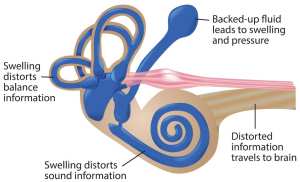

MedFriendly®


Vestibulopathy
Vestibulopathy is any abnormality in the vestibular
(balance) system. An example of vestibulopathy is
Meniere's disease, which is characterized by dizziness,
vomiting, nausea, ringing in the ears, and other signs
and symptoms due to inflammation of a tube in the ear.
Another example is bilateral vestibulopathy, which is
caused by damage to both inner ears leading to
problems with hearing, vision, and motor coordination.
Vestibulopathy is sometimes associated with migraine
headaches. Vestibulopathy can be present from birth or
it can be an acquired condition. For example,
vestibulopathy can result from acquired traumatic brain
injury.
Meniere's disease is a type of
vestibulopathy.
FEATURED BOOK: Vestibular Rehabilitation, 3rd. edition
Treatment of vestibulopathy involves treating the underlying medical cause. This can
involve the use of medications or surgery but can also involve physical therapy. The
latter is specifically known as vestibular rehabilitation. Because certain medications
(typically those that end in -mycin) can worsen symptoms of vestibulopathy, doctors and
other health care providers will provide advice on which medications to avoid. The word
vestibulopathy comes from the Latin word, "vestibulum," meaning "courtyard," and the
Greek word "pathos," meaning "suffering."
The word "vestibule" refers to an opening in the ear that is called the vestibule. It is called
a vestibule because it is an open area, like a courtyard. So vestibulopathy is "suffering in
the open area" (of the ear).
"Where Medical Information is Easy to Understand"™















